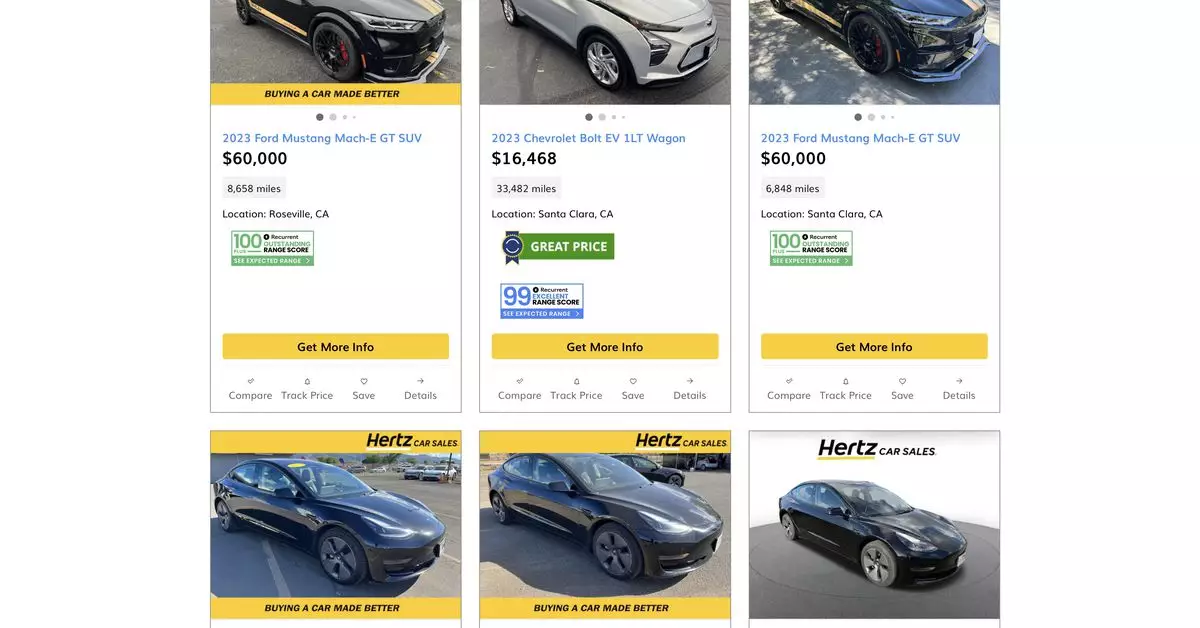As electric vehicles (EVs) continue to reshape the transportation landscape, companies are adapting in innovative ways. A prominent example of this trend is Hertz, the car rental giant that has grasped the potential of EVs not just as rental options but also as a viable sales market. Recently, Hertz has begun reaching out to its electric vehicle renters with attractive purchasing offers that could redefine the experience of renting an EV. This maneuver not only opens a new sales avenue for Hertz but also caters to consumers who may find themselves unexpectedly attached to their rented cars.
In a surprising turn of events, Hertz has offered significant discounts to renters who want to turn their temporary rides into permanent ones. A notable case involves a 2023 Tesla Model 3, where the renter reported a price of $17,913. This offer stands out as competitive when measured against typical sales prices for used vehicles in the market. Interestingly, the Tesla had accumulated around 30,000 miles, yet it remains more appealing than several other competing listings. Furthermore, other renters have reported similar offers for vehicles like the 2023 Chevy Bolt at $18,442, and even the Polestar 2 for $28,500.
These offers represent a compelling strategy for Hertz, particularly as they include limited warranties and a buy-back option, which eases the concerns potential buyers may have regarding the longevity or integrity of a rental vehicle. This structured approach allows Hertz to create a safety net that attracts prospective buyers who may be hesitant about purchasing a used rental car.
Hertz’s communications director, Jamie Line, emphasized that this initiative is part of a broader strategy to connect with customers through direct communication. By cultivating relationships with renters who receive emails about sales opportunities, Hertz not only raises awareness of its sales operations but also connects specific renters to the very vehicles they already appreciate. This strategy not only potentially increases sales but also enhances customer loyalty by offering them a unique opportunity to own a car they have grown accustomed to.
The shift towards selling rental EVs emerges in the context of Hertz revisiting its ambitious electrification goals. Last year, the company faced hurdles, including low customer demand for electric rentals and repair challenges associated with certain models. As part of its recalibration, Hertz initially announced its decision to step back from purchasing certain EV models but has now seemingly pivoted to harness existing rental inventory as a source of revenue. By turning these vehicles into sales opportunities, Hertz adapts to the changing dynamics of customer preferences while mitigating losses incurred from its earlier strategies.
Hertz’s initiative illustrates a forward-thinking approach that cleverly combines the rental and retail markets, particularly in the burgeoning EV sector. As consumers become more familiar with electric vehicles, rental organizations like Hertz may continue to innovate by creating purchasing pathways that cater to evolving mobility habits. This strategic offering not only highlights Hertz’s agility in a competitive market but also offers a glimpse into the potential transformations awaiting the automotive and rental industries alike. Ultimately, this move could signal a new era where renting an electric vehicle does not merely culminate in a return but provides the chance for ownership.

